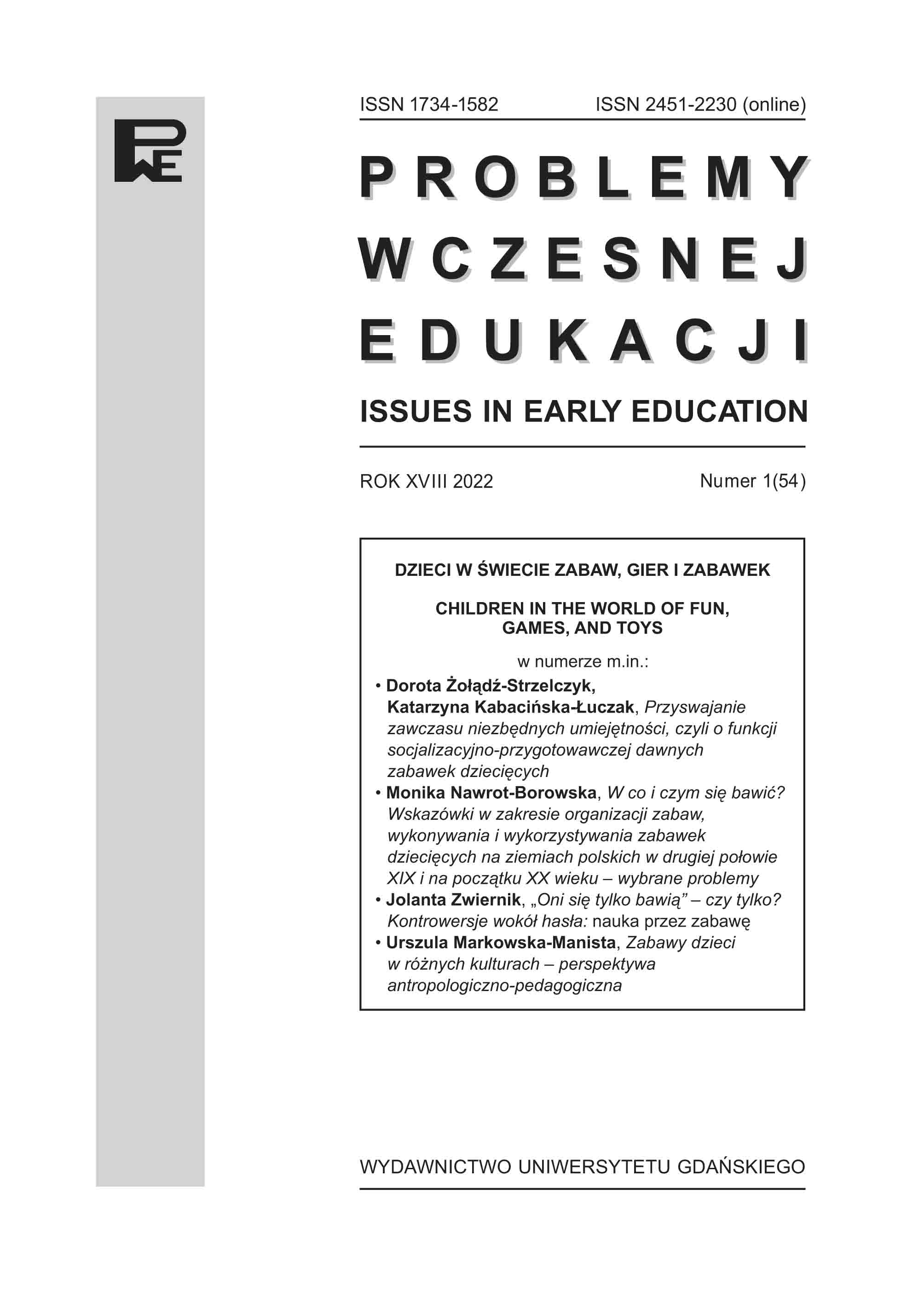Zabawy dzieci w różnych kulturach – perspektywa antropologiczno-pedagogiczna
DOI:
https://doi.org/10.26881/pwe.2022.54.04Słowa kluczowe:
badania nad dzieciństwami, zabawa, antropologia kultury, dzieciństwa, sprawczość dzieci, czas wolnyAbstrakt
The text refers to contemporary interdisciplinary research on children’s play in different cultures. The author reflects on the diverse functions of play in the context of the multiplicity of childhoods and in view of the changing conditions and contexts of children’s lives, as well as the changing models of childhood and the ways and possibilities of children’s functioning in the 21st century. New global processes and transformations, in which children are the most numerous group of participants, enable a broader insight into their situation and, above all, into play and toys – tools with which they recognize, encode and learn about the surrounding world.
Downloads
Bibliografia
Boski P. (2011), Poznawanie Afryki przez dzieci polskie za pośrednictwem gier i zabaw afrykańskich rówieśników. W: M. Jackowska, H. Rubinkowska (red.), Gry i zabawy afrykańskie. Warszawa, Dom Wydawniczy Elipsa.
Budde R., Markowska-Manista U. (red.) (2020), Childhood Studies and Children’s Rights between Research and Activism. Honouring the Work of Manfred Liebel. Wiesbaden, Springer.
Czaja-Chudyba I. (2006), Pedagogika zabawy w osobowym i profesjonalnym przygotowaniu do zawodu nauczyciela. Kraków, Wydawnictwo Naukowe Akademii Pedagogicznej.
Dockett S. (2008), Hlustað á raddir barna – Börn og rannsóknir. Í Jóhanna Einarsdóttir og Bryndís Garðarsdóttir (ritstjórar), Sjónarmið barna og lýðræði í leikskólastarfi. Reykjavík, Háskólaútgáfan og RannUng.
Fiedler J., Posch Ch. (2009), Yes, they can! Children researching their lives. Baltmannsweiler, Schneider Verlag Hohengehren.
Galimberti G. (2014), Toy Stories: Photos of Children from Around the World and Their Favorite Things. New York, Abrams Image.
Grygierek M. (2011), Edukacja międzykulturowa. W: M. Jackowska, H. Rubinkowska (red.), Gry i zabawy afrykańskie. Warszawa, Dom Wydawniczy ELIPSA.
Hewlett B. (1993), Intimate Fathers. The Nature and Context of Aka Pygmy Paternal Infant Care. Ann Arbor, University of Michigan Press.
Hoban I. (2022), Militarization of childhood(s) in Donbas. ‘Growing together with the Republic’. „Cooperation and Conflict”, 57(1).
Holmes R. (2012), Children’s play preferences in the Pacific Rim: Then and now. W: L. Cohen, S. Waite-Stupiansky (eds.), Play. A polyphony of research, theories and issues. Lanham, MD, University Press of America.
Huizinga J. (1950), Homo ludens, a study of the play-element in culture. New York, Roy.
James A. (1998), Play in childhood: an anthropological perspective. „Child Psychology and Psychiatry Review”, 3(3).
Karpatschof B. (2013), Play, but not simply play: The anthropology of play. W: I. Schousboe, D. Winther-Lindqvist (eds.), Children’s Play and Development. Dordrecht, Springer.
Keller H., Borke J., Chaudhary N., Lamm B., Kleis A. (2010), Continuity in parenting strategies: A cross-cultural comparison. „Journal of Cross-Cultural Psychology”, 41(3).
Lancy D. (2001), Cultural constraints on children’s play. „Play & Culture Studies”, 4.
Lester S., Russell W. (2010), Children’s Right to Play. An Examination of the Importance of Play in the Lives of Children Worldwide. Working Papers No. 57. The Hague, Bernard van Leer Foundation.
Liebel M. (2020), Decolonizing Childhoods. From Exlusion to Dignity. Bristol, Policy Press.
Liebel M., Markowska-Manista U. (2017), Prawa dziecka w kontekście międzykulturowości: Janusz Korczak na nowo odczytany. Warszawa, Wydawnictwo Akademii Pedagogiki Specjalnej im. M. Grzegorzewskiej.
Markowska-Manista U. (2013), Świat życia codziennego dziecka marginalizowanego w Afryce Środkowej. Na przykładzie dzieci łowców-zbieraczy Ba’Aka w Republice Środkowoafrykańskiej. „Rocznik Pedagogiczny”, 36.
Markowska-Manista U. (2019), ‘Bad Children’ – International stigmatisation of children trained to kill during war and armed conflict. W: N. von Benzon, C. Wilkinson (eds.), Intersectionality and Difference in Childhood and Youth. Global Perspectives. London–New York, Routledge the Taylor & Francis Group.
Markowska-Manista U., Koshulko O. (2021), Children and Childhood on the Borderland of Desired Peace and Undesired War – A Case of Ukraine. W: J.M. Beier, J. Tabak (eds.), Childhood in Peace and Conflict. New York, Palgrave Macmillan, https://doi.org/10.1007/978-3-030-74788-6_10, 10.05.2022.
Moss P., Petrie P. (2002), From Children’s Services to Children’s Spaces. Public Policy, Children and Childhood. London, Routledge Falmer.
Ólafsdóttir S.M. (2019), Children’s play in peer cultures: Icelandic preschool children’s views on play, rules in play, and the role of educators in their play. https://opinvisindi.is/han-dle/20.500.11815/2529, 10.05.2022.
Pramling Samuelsson I., Johansson E. (2009), Why do children involve teachers in their play and learning? „European Early Childhood Education Research Journal”, 17(1).
Retting M. (1995), Play and Cultural Diversity. „The Journal of Educational Issue of Language Minority Students”, 15.
Roopnarine J.L., Johnson J.E., Hooper F. (1994), Children’s play in diverse cultures. Albany, NY, State University of New York Press.
Santos Boaventura de Sousa (2016), Epistemologies of the South: Justice against Epistemicide. New York–London, Routledge.
Schwartzman H.B. (1976), The anthropological study of children’s play. „Annual Review of An-thropology”, 5(1).
Spariosu M. (1989), Dionysus reborn. Play and the aesthetic dimension in modern philosophical and scientific discourse. New York, Cornell University Press.
Tuhiwai Smith L. (2012), Decolonizing Methodologies. Research and Indigenous Peoples. London–New York, Zed Books.
Turner V. (1974), Liminal to Liminoid, in Play, Flow, and Ritual. An Essay in Comparative Symbology. „Rice Institute Pamphlet-Rice University Studies”, 60(3).
Twum-Danso Imoh A., Bourdillon M., Meichsner S. (2019), Global Childhoods beyond the North-South Divide. Cham, Palgrave Macmillan.
Vygotsky L.S. (1978), The role of play in development. W: Vygotsky L.S., Mind in society. Cambridge, MA, Cambridge University Press.
Whitebread D., Basilio M., Kuvalja M., Verma M. (2012), A report on the value of children’s play with a series of policy recommendations. https://www.waldorf-resources.org/fileadmin/files/pic-tures/Early_Childhood/dr_david_whitebread_-_the_importance_of_play.pdf, 10.05.2022.
Wrzesińska A. (2005), Mwana znaczy dziecko. Warszawa, Wydawnictwo Akademickie Dialog.

 Uniwersyteckie Czasopisma Naukowe
Uniwersyteckie Czasopisma Naukowe





